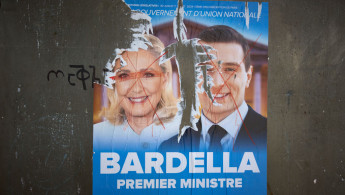Is there a future for France-Algeria memory accords under far-right French rule?
For sixty-two years, Algeria struggled to move past its bloody history with France, and a memory accord with Paris was made in hopes to heal the wounds of colonisation. However, the rise of the far-right threatens to derail this process.
In the first round of French legislative elections, the far-right National Rally (RN) and its allies obtained nearly 33.34% of the vote, electing 39 deputies directly.
If they come first in the second round, scheduled for 7 July, Jordan Bardella, the party's controversial figure, will become the country's prime minister.
Bardella, who has garnered wide popularity in France with his nationalist rhetoric and a forced 'Casanova' image, has yet to announce a clear diplomatic agenda.
But a glance at the party's legacy paints a very grim picture of what Bradella's policy might be vis-à-vis Paris' former colony: Algeria.
National Front: nostalgia for French Algeria
"It's historically known that the National Front party is a political group that still harbours nostalgia for 'l'Algérie française' (French Algeria)," explained Donia Ismail, a Franco-Algerian journalist, to The New Arab.
'French Algeria' refers to the period from 1830 to 1962 when Algeria was under a brutal French colonial rule. Algeria was considered part of France rather than merely a colony during this time.
After Algeria fought and gained independence, several pieds-noirs—French settlers who had to leave North Africa post-independence—still fantasise about the glory of this period and what could have been if Algeria had never been liberated.
The RN's infamous founder, Jean-Marie Le Pen, a proponent of 'French Algeria,' was a paratrooper during the Battle of Algiers in 1957 and was implicated in torture and war crimes based on several investigations over the years.
The French-Algeria fantasy has earned the movement popularity in localities of southern France with a high concentration of pieds-noirs, which will inevitably weigh on the connection between Paris and Algiers in the event of a Bardella government, explains Donia Ismail further.
"A National Rally (RN) government will poison relations with Algeria," anticipates also Madjid Benchikh, former dean of the Faculty of Law in Algiers.
Memory Accord in peril?
In 2022, Algeria and France established a joint commission, composed exclusively of historians, an initiative by President Emmanuel Macron for a "fair treatment" of the memory between the two states.
During the Algerian War of Independence, France killed between 300,000 and 1.5 million people, including both combatants and civilians.
Throughout 132 years of colonisation, France committed numerous war crimes, such as rape and torture, against both combatants and civilians, as documented by historians.
Algeria insists that the improvement of relations with France is tied to progress on the memory file, addressing four main issues: complete retrieval of archives, return of the skulls and remains of resistance fighters, compensation for victims of nuclear tests and clean-up of lands contaminated by nuclear radiation, and disclosure of the fate of the missing.
However, the RN has consistently rejected any effort at reconciliation with Algeria, first attempted by the left and then amplified by Emmanuel Macron.
In 2012, Marine Le Pen denounced as a "profoundly destructive, profoundly divisive gesture" François Hollande's decision, president at the time, to "recognise with lucidity the bloody repression" of the pro-FLN demonstration on 17 October 1961, in Paris, when French security forces killed several dozen Algerians, some of whom drowned in the Seine.
In 2021, when historian Benjamin Stora submitted his report on memorial reconciliation between France and Algeria to Macron, Louis Aliot, an RN member, exclaimed: "Shameful! Has Macron decided to declare a memorial war on French families who suffered greatly from FLN atrocities and their accomplices?"
Meanwhile, other party members like Nicolas Bay dare to argue "the undeniably positive aspects of colonisation." (Bay has recently joined Reconquête—Eric Zemmour's far-right party).
Under such circumstances, it is hard to see what would remain of the French president's attempt at memorial reconciliation.
Implementing the Stora report's recommendations involves various administrations such as the ministries of culture, education and defence, so an RN government would inevitably block any initiative.
Far-right to rewrite post-independence treaty
"The RN wants to rewrite history," points out journalist Donia-Ismail in her interview with TNA, referring to the party's promise to revise the 1968 Franco-Algerian Agreement.
Bardella and Le Pen alliance are considering questioning the 1968 Franco-Algerian Agreement, which grants Algerians a special status different from the common law for foreigners regarding travel, residence, and employment in France.
"We are going to review the 1968 agreement," declared Sébastien Chenu, vice-president of the far-right party, on French media BFM-TV on 27 June.
This idea originated with diplomat Xavier Driencourt, who served two terms as ambassador in Algiers (2008-2012, 2017-2022). His name is circulating as a possible future foreign minister in an RN government, following his several meetings with the RN leaders.





 Follow the Middle East's top stories in English at The New Arab on Google News
Follow the Middle East's top stories in English at The New Arab on Google News


